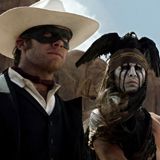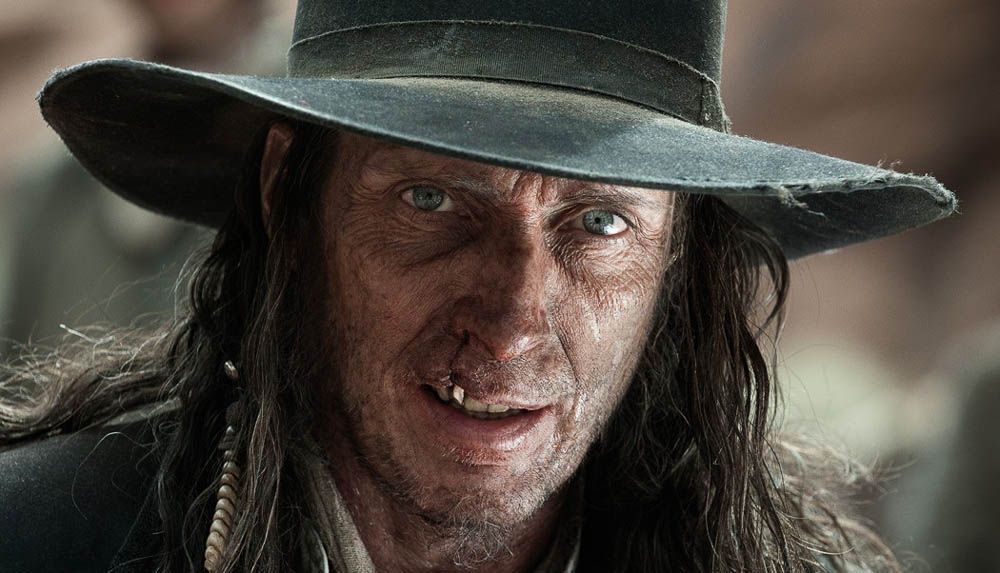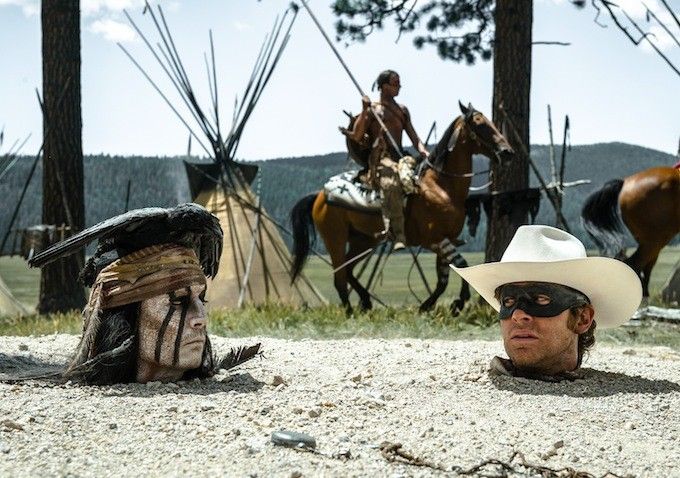There are things that seem impossible to understand in Disney’s The Lone Ranger, the Gore Verbinski update of the radio and television serial hero of the same name, but none more so than why people so seemingly contemptuous of this source material would be appointed to bring it to the screen. Busy, stupid and incredibly violent, this new story offers nonsensical action and halfhearted revisionism in its reimagining of the character, who once stood for singular virtue in the Old West, and his “noble savage” partner Tonto.
Working with the same high-octane, low-output creativity that fueled the Pirates of the Caribbean series through four decreasingly satisfying installments, Verbinski and producer Jerry Bruckheimer deliver a mean-spirited, misguided, overlong time-waster whose description as “popcorn” fare is fittingly appropriate, as it’s an aggressively unhealthy substitute for more intellectually and emotionally nourishing entertainment.
Armie Hammer (The Social Network) plays John Reid, a law-school graduate who returns to his dusty hometown to find it balancing on a precipice between “Wild West” unruliness and the teeming possibilities of an industrialized future. Immediately finding himself deputized by his more classically heroic brother Dan (James Badge Dale), John rides into the desert to apprehend snaggletoothed criminal Butch Cavendish (William Fichtner). But Cavendish ambushes their posse, killing Dan and leaving John for dead – that is, until Native American warrior Tonto (Johnny Depp) shows up and revives him at the behest of forces from the spirit world.
Proclaiming John a “spirit rider,” Tonto takes his side as partner and the two race to capture Cavendish and bring him to justice. But when Cavendish’s fiendish plans begin to oddly figure into the more noble aspirations of hometown benefactor Latham Cole (Tom Wilkinson), Reid is forced to decide whether it’s better to live lawfully in a corrupt world or to defend justice as an outlaw.
Admittedly, it was only in researching the background details of the Lone Ranger for this review that I was fully able to understand how much Verbinski’s “reimagining” departs from the character’s mythology. But even if that decades-old lexicon of virtuous behaviors and philosophies were fully irrelevant and the character’s gray-area heroism desperately needed to be examined, The Lone Ranger simply does not do that. Instead, screenwriters Ted Elliot, Terry Rossio and Justin Haythe introduce John Reid as a wholesome dimwit whose squeaky-clean pursuit of upholding the law was an ethos that wasn’t merely hopelessly outdated but literally impossible to follow through with.
That the character has always insisted upon disarming his opponents as painlessly as possible – and certainly never by killing them – would seem to present the purveyors of a PG-13 summer movie with an enormous opportunity, and yet they seem to regard it like an albatross around Reid’s neck, eventually turning his “justice”–driven justification for nonviolence into a series annoying, self-imposed obstacles that repeatedly expose his perceived ignorance about the “real world.”
Meanwhile as Tonto, Depp gives a performance that should delight fans of his Pirates turn as Jack Sparrow; both characters exude a decidedly loose sense of morality when it comes to accomplishing their goals at others’ expense, and of course both possess a sort of semi-drunken weirdness that Depp tries to present as charm. Notwithstanding more obvious examples, I’ve actually reached a point where I can no longer tell what constitutes an acceptable portrayal of an ethnic character by a white actor, and Depp’s performance fails to present the character beyond noble, smart and perhaps naively spiritual. Tonto calling Reid “stupid white man” and encouraging Chinese railroad workers to laugh at him doesn’t qualify as an improvement or redefinition of those stereotypes, and Depp’s bug-eyed performance only reiterates the one-dimensional way in which we still think of Native Americans.
Further, there’s a framing device in which an octogenarian Tonto relays the origin story of John Reid that absolutely defies explanation, for multiple reasons -- not the least of which being Depp. Notwithstanding the decision to have what appears to be a carnival attraction come to life and speak with a little kid who could be the spitting image of the one in Robert Redford’s The Legend of Bagger Vance, the device’s purpose seems to be highlighting Tonto’s unreliability as a narrator, or the child’s position as audience proxy pointing out how little of his story makes sense. At a bloated 149 minutes, this film shouldn’t be one second longer than necessary, but Verbinski’s well-intentioned focus on Tonto ends up adding at least 10 or 15 superfluous moments of storytelling.
That said, between Elliot, Rossio and Haythe’s many subplots involving peripheral or secondary characters, that framing device ranks as the most obvious material to cut even if it isn’t the most unnecessary. It’s not enough to have Cavendish and a small army of subordinates who carry out his diabolical schemes; there has to be crooks and bad guys with “unique” personalities like Frank (Harry Treadaway), a sniveler with an appetite for women’s clothing. Reid’s brother not only has a plucky widow named Rebecca (Ruth Wilson), but she’s actually in love with John, not Dan, even as Latham Cole makes conspicuous overtures that he would like to replace Dan as her husband and be father to her son Danny (Bryant Prince). And Barry Pepper (True Grit) plays a military martinet who, because the plot demands another foe for Reid and Tonto to battle, willfully chooses to believe he hasn’t slaughtered innocent Native Americans after receiving evidence that he has done precisely the opposite.
Speaking of slaughter, The Lone Ranger is one of the most amazingly violent summer movies – especially PG-13 summer movies – released in recent memory. One character eats another’s heart. Not one but two train wrecks lay waste to bystanders and railroad workers. A roomful of fat cats is blasted into splinters while gunmen try to shoot an unrelated fugitive. And the decimation of an army of Indians by minigun is punctuated by the first-person stabbing of their chief. For a film with a protagonist whose ethos is one of disarmament, it’s fairly disturbing to see the filmmakers interpreted that to mean actually removing people’s arms (or other body parts). Of course, when time comes to vanquish the “real” villains, the characters learn the spectacularly wrongheaded lesson that “justice” is better meted out at the bottom of a canyon under an exploding train car of silver than, say, in the court of law that Reid was fighting to defend throughout the rest of the film’s running time.
Ultimately, Verbinski’s film emerges from the same more-is-more pedigree that begat three god-awful Pirates sequels, and what seems like just about every hopeful tentpole movie made by studios these days: Its conception is justified by infinite moneymaking possibilities, enabled by bottomless finances and yet executed with scarcely a fraction of the creativity. The problem with money earned or money spent isn’t the money itself; it’s that what shows up on screen is nothing but money. There’s virtually no creativity or coherence in those set pieces, only a balance sheet accumulating the cost of pulling off an enormous feat that still somehow doesn’t manage to fit narratively or structurally into any other part of the movie for which it was made. The Lone Ranger exudes hubris – filmmakers behind the scenes saying, “I can spend the most money to make the biggest movie” – but what it needs most is modesty and common sense. Not only would those qualities be much truer to the ideal and morals of the character the film is named after, they would also make for a much better foundation for just about any movie that actually intended to be about him.
The Lone Ranger opens today nationwide.



